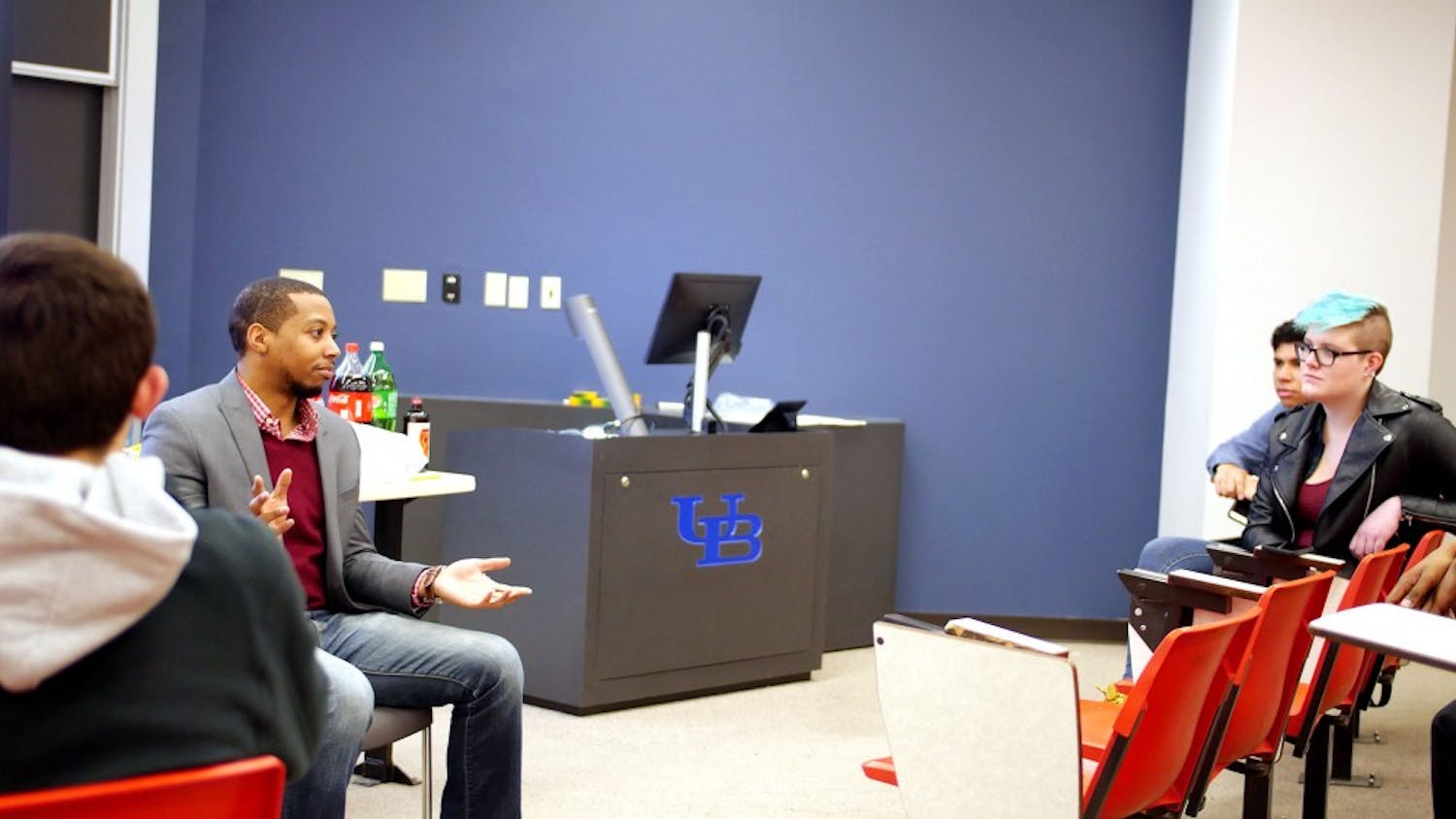As the UB Distinguished Speaker Series celebrates its 25th year, Robert Gates is celebrating a similar anniversary. After working more than 27 years at the top tiers of the United States government, Gates is retired and ready to talk.
Gates, the 22nd U.S. Secretary of Defense and former Central Intelligence Agency director, spoke Wednesday night in Alumni Arena. His lecture was the first in the 2011-12 UB Speaker Series, and was an official event of Inauguration Week. He has served in various positions under eight different presidents and was the first Secretary of Defense to be asked to remain at the position when a newly-elected president took office.
"It's a real pleasure to be here in Buffalo," Gates said in his opening statements. "But then again, it's a pleasure to be anywhere but Washington, D.C."
Gates' lecture focused on serious policy issues, foreign and domestic, including the role of the U.S. in a post-9/11 world, the wars in Afghanistan and Iraq, the threat of nuclear weaponry in Iran, and the economic power of China.
He believes that the U.S. should not diminish its ability, or determination, to handle threats that arise. If threats are not dealt with swiftly, they will arise on our doorstep, according to Gates.
Referencing the attacks on Sept. 11, Gates emphasized that pursuing terrorists is a crucial tenet of American foreign policy. Gates also conceded that it is unrealistic to expect the U.S. government to be able to stop all future terrorist attacks in a nation of more than 300 million people.
"We can no more eliminate terrorism than we can eliminate crime," Gates said. "It's not the size and the lethality of the attacks but the psychological, economical, and political impact on us of their efforts."
Gates encouraged those in attendance to never forget the lessons of history and to remember that there are no painless solutions. As Secretary of Defense, Gates cut $330 billion in "fatty" defense spending across 33 programs. He hopes that the Obama administration will not cut the muscle.
"The good news is that some balance and sense of propriety seems to be returning to the Homeland Security arena," Gates said.
Regarding the war Afghanistan, Gates described a three-pronged strategy: to weaken the Taliban, to strengthen Afghan forces so that they are able to take control of their own security, and to keep al-Qaida and other terrorist groups out.
"These past two years, we finally got the strategy right," Gates said. "We dedicated the necessary resources – civil and military – to achieve our objectives there."
Gates explained that leaving Afghanistan again before the government and the security forces are fully functional would be "unconscionable," recalling the U.S. "abandonment" of said nation during the Cold War.
"This war will always be tainted in the eyes of many, if not most Americans, for how and why it was launched. What we cannot do is let our frustration with the challenges and the costs of Afghanistan turn into a premature rush to the exits," Gates said. "If the United States had left the country with our tail between our legs in early 2007, leaving chaos and carnage in our wake, it would have been a major win for al-Qaida and the ideology that attacked us on Sept. 11," Gates said.
Unrest across the Middle East, in Tunisia, and in Egypt remains prevalent. As has been happening over the past nine months, the will and action for political freedom and social change must originate and occur internally, according to Gates.
"Whatever happens across the [Middle East] will play out over time and, frankly, there isn't much outsiders can do to affect the outcome," Gates said.
Gates is convinced that Iran is developing nuclear capabilities. As the Iranian government becomes increasingly surrounded by nations who are moving forward with nuclear technology, Iran has determined ways to conceal the weapons in locations – such as underground – not yet found by U.S. intelligence.
Still, Gates does not support U.S. involvement in Iran. Although initial attacks could prove successful, as in Iraq, after several years the Iranian populace would turn against occupation and rally behind the government.
"Iraq has a democracy and we can only hope that after all our, and their, sacrifices that they can keep it," Gates said. "If you think [the Iraq war] was hard, an attack on Iran would be, in my opinion, catastrophic."
Gates also touched on the events surrounding recent reports by the International Monetary Fund (IMF) that China will become the world's dominant economy by 2016. Whether the U.S. and China will stay on friendly terms, and avoid political paralysis, depends on how leaders play their cards.
"If we treat China as an enemy, it is sure to become one," Gates said.
He referenced that although China is both a partner and competitor, the relationship may be tainted by anti-foreigner campaigns that the Chinese government sponsors.
Before Dr. Gates took the stage in Alumni Arena, The Spectrum and Generation were allowed a brief interview with the former Secretary of State. Although each publication was allowed only five questions, Gates spoke with us frankly and with the calm collection for which he has become so well known.
Dr. Gates, as Secretary of Defense, you worked under Presidents Bush and Obama. How would you compare their presidencies?
I think in some ways the biggest difference was not so much in the presidents as it was in the Congress. Under the Bush Administration, I would go to [Capitol] Hill and the Republicans would be sitting here and the Democrats would be sitting over there. And the Republicans were my friends and the Democrats were hostile, mostly, at least toward the administration, not toward me. And then the election happened, and I was President Obama's secretary of defense and all of the sudden the Republicans were my adversaries [and the] Democrats were my friends. And I'm sitting there saying, "Hey! I'm the same person, what happened here?" So, it's just the way politics operate in Washington. They're very different men and they have very different styles. They're both committed to protecting the American people.
Throughout your work at the CIA and the department of defense, how did you stay so up-to-date and organized? What was the system for information dissemination?
Well, there is a lot of reading. And there's probably a foot, foot and a half, of paper that comes across the desk every day. And I think one of the things experience helps you with is knowing what you have to read really carefully and what you can just scan. So, there's a lot of stuff you can move through pretty fast and particularly, you get to accumulate an amount of knowledge. What you're looking for is just one or two new things and if you have good staff working for you – and I did – they can whittle that stuff down and make it a very efficient process. But there's a lot of reading and a lot of integration of information. Sometimes, you'll get a briefing for a National Security Council meeting that's an inch thick and you get it 15 minutes before the meeting starts, before you go get in the car to go to the White House. And just through experience, you figure out what you need to look for in that 15-minute ride.
How do you handle protests or particularly hateful comments about work you've done, and how does it affect you?
I have not yet had much experience with that yet as Secretary of Defense. The people who disagree with the decisions I've made or the recommendations I've made have been respectful. They have been thoughtful. I never felt it was directed at me personally; I think that's another thing to remember is that it's really not about you. The other side of it is, you sort of get used to these things. When I was head of the CIA I had a guy outside the White House for a year wearing a football helmet covered in aluminum foil with a big sign complaining that I was directing his brain waves.
In the 1970s, many leaders you were in contact with later turned out to have engaged in mass killings or human rights violations. Can you truly determine whether a country is a friend or foe?
During the Cold War, it's no secret that we dealt with a lot of people who had some pretty bad records in their own countries. But, it was the view of multiple presidents that it was important in keeping the Cold War cold and avoiding a conflict that could destroy the world. Some leaders are your enemies, then they become your partners, then they become enemies again. [Muammar] Gaddafi is a good example of that. He was our enemy for decades, then gave up his nuclear program and paid compensation for Pam-Am 107, sanctions were lifted, and then he began brutalizing his own people and he became an adversary again. President Washington actually was pretty clear about this: there really is no such thing as permanent friends or permanent enemies. There are some countries where decade in and decade out, they will be our friends and allies – the British, the French, the Germans, a variety of Europeans, the Japanese, the South Koreans. But, there's a big slop of countries that are in the middle and you have to learn how to deal with them.
As president of Texas A&M University, you proposed and worked on a development plan similar to UB2020, called Vision 2020. What is your vision for higher education?
If the nation intends to continue to grow economically and to prosper and to sustain a democracy, an educated populace is the only way to do that. At the heart of economic prosperity is higher education. And particularly, research universities are engines of growth for every state. These big public universities that are research universities, as well as teaching universities, play a huge role in the economies of our states. Unfortunately, I think that a lot of states have lost sight of that and virtually every university system in the country has seen a significant reduction in the amount of state support. I think that's very short-sighted.
Email: news@ubspectrum.com





